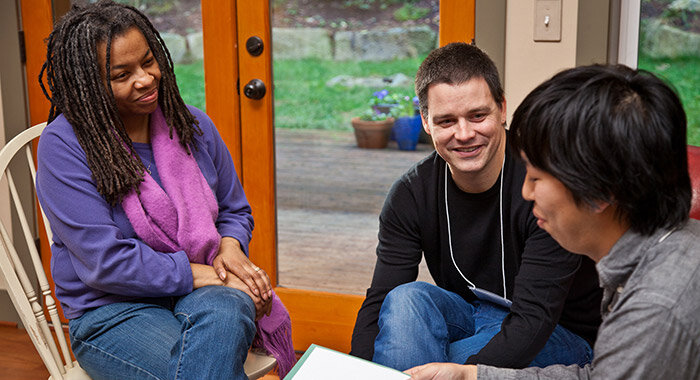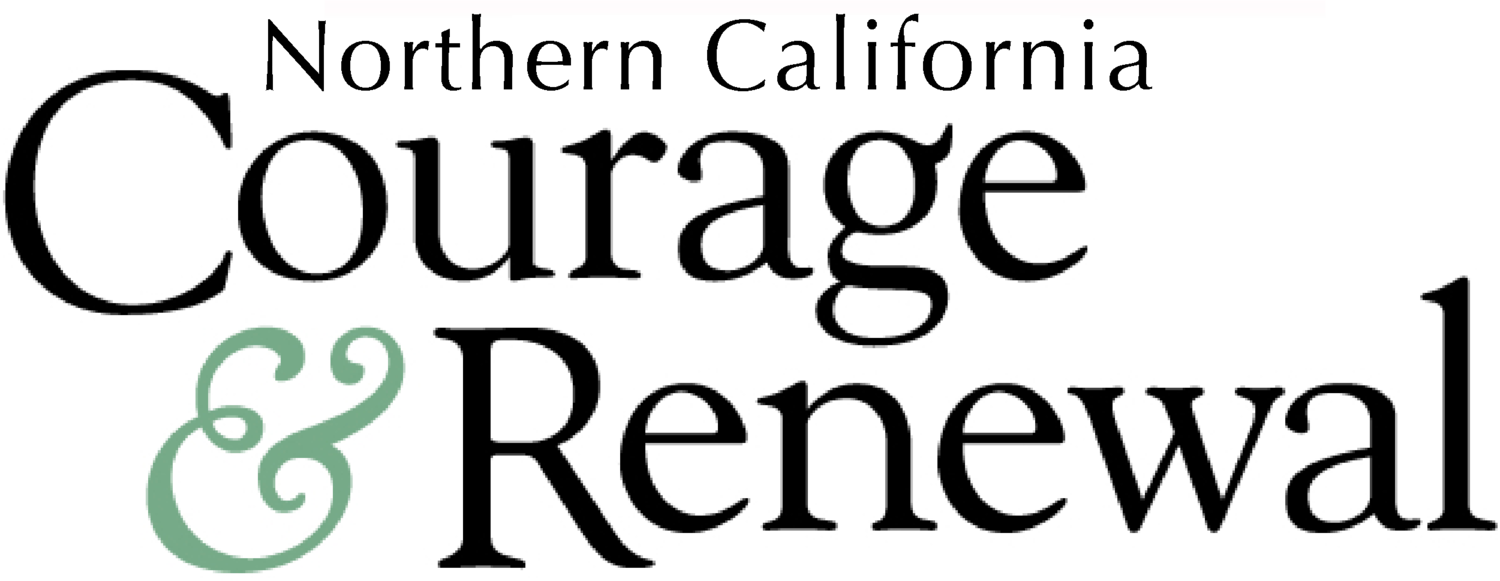
“A circle of trust can form wherever two or three are gathered—as long as those two or three know how to create and protect a space for the soul.” – Parker J. Palmer
CIRCLES OF TRUST®
All programs offered by Courage & Renewal facilitators, whether in-person or online, are informed by the Circle of Trust® approach, based on the work of author and activist Parker J. Palmer. These programs are designed to create a safe space for self-reflection and trustworthy communication, a space where people can nurture personal and professional integrity and the courage to act on it. Whether in multi-day retreats, shorter programs, or online settings, Circle of Trust® programs make use of poetry and stories, solitude and reflection, journaling and deep listening. More than 230 facilitators are actively using this approach in eleven countries worldwide and more are in preparation. Their programs, attended by thousands, have helped transform individuals, families, workplaces and communities. Circle of Trust® programs take a variety of forms for a variety of audiences, but all are informed by the following principles and practices.
PRINCIPLES OF THE CIRCLE OF TRUST® APPROACH
If we are willing to embrace the challenge of becoming whole, we cannot embrace it alone— at least, not for long. We need trustworthy relationships and tenacious communities of support to sustain the journey toward an undivided life. Taking an inner journey toward rejoining soul and role requires a rare but real form of community that I call a “circle of trust.”
—Parker J. Palmer, A Hidden Wholeness (adapted)
• Everyone has an inner teacher: Every person has access to an inner source of truth, named in various wisdom traditions as identity, true self, heart, spirit or soul. The inner teacher is a source of guidance and strength that helps us find our way through life’s complexities and challenges. Circles of Trust® give people a chance to listen to this source, learn from it and discover its imperatives for their work and their lives.
• Inner work requires solitude and community: In Circles of Trust® we make space for the solitude that allows us to learn from within, while supporting that solitude with the resources of community. Participants take an inner journey in community where we learn how to evoke and challenge each other without being judgmental, directive or invasive.
• Inner work must be invitational: Circles of Trust® are never “share or die” events, but times and places where people have the freedom within a purposeful process to learn and grow in their own way, on their own schedule and at their own level of need. From start to finish, this approach invites participation rather than insisting upon it because the inner teacher speaks by choice, not on command.
• Our lives move in cycles like the seasons: By using metaphors drawn from the seasons to frame our exploration of the inner life, we create a hospitable space that allows people of diverse backgrounds and perspectives to engage in a respectful dialogue. These metaphors represent cycles of life—such as the alternation of darkness and light, death and new life—shared by everyone in a secular, pluralistic society regardless of philosophical, religious or spiritual differences.
• An appreciation of paradox enriches our lives and helps us hold greater complexity: The journey we take in a Circle of Trust® teaches us to approach the many polarities that come with being human as “both–ands” rather than “either–ors,” holding them in ways that open us to new insights and possibilities. We listen to the inner teacher and to the voices in the circle, letting our own insights and the wisdom that can emerge in conversation check and balance each other. We trust both our intellects and the knowledge that comes through our bodies, intuitions and emotions.
• We live with greater integrity when we see ourselves whole: Integrity means integrating all that we are into our sense of self, embracing our shadows and limitations as well as our light and our gifts. As we deepen the congruence between our inner and outer lives we show up more fully in the key relationships and events of our lives, increasing our capacity to be authentic and courageous in life and work.
• A ”hidden wholeness“ underlies our lives: Whatever brokenness we experience in ourselves and in the world, a “hidden wholeness” can be found just beneath the surface. The capacity to stand and act with integrity in the gap between what is and what could be or should be—resisting both the corrosive cynicism that comes from seeing only what is broken and the irrelevant idealism that comes from seeing only what is not—has been key to every life-giving movement and is among the fruits of the Circle of Trust® approach.
PRACTICES OF THE CIRCLE OF TRUST APPROACH
In this culture, we know how to create spaces that invite the intellect to show up, to argue its case, to make its point. We know how to create spaces that invite the emotions to show up, to express anger or joy. We know how to create spaces that invite the will to show up, to consolidate effort and energy around a common task. And we surely know how to create spaces that invite the ego to show up, preening itself and claiming its turf! But we seem to know very little about creating spaces that invite the soul to show up, this core of ourselves, our selfhood.
—Parker J. Palmer, A Hidden Wholeness (adapted)
• Creating spaces that are open and hospitable, but resource-rich and charged with expectancy: In a Circle of Trust®, we are invited to slow down, listen and reflect in a quiet and focused space. At the same time, we engage in dialogue with others in the circle—a dialogue about things that matter. As this “sorting and sifting” goes on, and we are able to clarify and affirm our truth in the presence of others, that truth is more likely to overflow into our work and lives.
• Committing to no fixing, advising, “saving” or correcting one another: Everything we do is guided by this simple rule, one that honors the primacy and integrity of the inner teacher. When we are free from external judgment, we are more likely to have an honest conversation with ourselves and learn to check and correct ourselves from within.
• Asking honest, open questions to “hear each other into speech”: Instead of advising each other, we learn to listen deeply and ask questions that help others hear their own inner wisdom more clearly. As we learn to ask questions that are not advice in disguise, that have no other purpose than to help someone listen to the inner teacher, all of us learn and grow.
• Exploring the intersection of the universal stories of human experience with the personal stories of our lives: Guided conversations focused on a poem, a teaching story, a piece of music or a work of art—drawn from diverse cultures and wisdom traditions—invite us to reflect on the “big questions” of our lives, allowing each person to intersect and explore them in his or her own way.
• Using multiple modes of reflection so everyone can find his or her place and pace.
In Circles of Trust®, we speak and we listen. We explore important questions in large group conversation and dialogues in small groups. We make time for individual reflection and journaling. We respect nonverbal ways of learning, including music, movement and the arts. We honor the educative power of silence and the healing power of laughter. Together we weave a “tapestry of truth” with many and diverse threads, creating a pattern in which everyone can find a place that both affirms and stretches them.
• Honoring confidentiality: Participants in Circles of Trust® understand that nothing said in these circles will be revealed outside the circle and that things said by participants will not be pursued when a session ends, unless the speaker requests it.

Photos courtesy of the Center for Courage & Renewal


THE CENTER FOR COURAGE & RENEWAL
In 1997, Parker J. Palmer with Rick and Marcy Jackson founded what would become the Center for Courage & Renewal. First known as the Center for Teacher Formation, it began as a program within the Fetzer Institute. Courage to Teach® became the premier program helping teachers connect soul with role, rekindling their passion for educating the whole student.
As the Center’s Circle of Trust approach grew more popular within the teaching profession as well as other social sectors, the Center for Courage & Renewal was established as an independent nonprofit in 2003. Programs are now available for leaders in health care, ministry, business and community settings, as well as to everyone yearning to become more authentic and self-aware in their life and work.
The Courage & Renewal Network of Northern California is a regional affiliate of the Center for Courage & Renewal. Our common mission is to create a more just, compassionate and healthy world by nurturing personal and professional integrity and the courage to act on it. You can learn more about the Center and its work by visiting the Center for Courage & Renewal website.
Courage & Renewal facilitators do not discriminate on the basis of race, creed, color, ethnicity, national origin, religion, sex, sexual orientation, gender expression, age, height, weight, physical or mental ability, veteran status, military obligations, and marital status.
OUR CORE VALUES
Integrity/Wholeness: Living and working with integrity requires us to develop greater congruence between our inner and outer selves, to live less divided lives. To move towards such wholeness we must become more self-aware and accepting of our gifts and strengths as well as our shadows and limits.
Authenticity: When we “show up” as whole people and act authentically, those with whom we live and work are more willing to trust us in relationship and leadership. This can lead to transformed workplaces and organizations.
Diversity: Diversity is a deeply valued source of strength, richness and wisdom for us and for the communities in which we live and work. The capacity to welcome and make space for diverse voices and multiple perspectives is critical to the creation of circles of trust, and to the healing and wholeness needed in our world.
Community: As we do “inner work,” we are not simply focusing inwardly on ourselves. Rather, we become more aware of the fabric of our connectedness with others in our families, workplaces, and communities. This results in an ongoing sense of responsibility and stewardship of the people and concerns that most matter to us.
Courage: For people whose vocation is serving others, courage is needed to persevere and be “whole-hearted” in the often overwhelming circumstances in which we are trying to make a difference—whether that be in the life of child, patient, congregation or community.
Love: Our work is grounded in love, by which we mean the capacity to extend ourselves for the sake of another person’s growth. Our work in community stretches us to understand, respect, and support each other, teaching us why learning to love is one of the most demanding disciplines we can choose.
Hope: Hope is believing and acting on our finest and most dearly held dreams, persisting even when the odds are against them. In the midst of the despair and broken-heartedness experienced by so many in our world today, our work engenders hope for people to live purposeful lives, do meaningful work, and make contributions to succeeding generations.
Renewal: Just as we experience nature’s cycle of renewal through the seasons, so we experience natural cycles of engagement and withdrawal, love and loss, creativity and despair in our personal lives and work. When we take time to slow down, quiet ourselves and reflect, to renew ourselves and recall our commitments, important changes can happen within us and around us. As we who are teachers, healthcare providers, clergy, lawyers, and community leaders are renewed, we in turn can contribute to the renewal of our professions, workplaces, and communities.
THE PRINCIPLES AND PRACTICES AT WORK IN THE WORLD
Participants in a Circle of Trust® return to their homes, workplaces and communities, taking two important resources with them:
1) Greater access to the inner teacher and a new depth of self-knowledge, often resulting in a clearer sense of guidance for their personal and professional lives and a resolve to live closer to their core commitments.
2) Principles and practices from the Circle of Trust® approach that can be applied to their daily lives.
As a result of participating in Circles of Trust®, people report:
a stronger sense of purpose and integrity
expanded capacity to be fully present to others in ways that affirm and heal
increased skill in asking the honest, open questions that help others uncover their own inner wisdom
greater confidence to seek or create communities of support
increased understanding, appreciation and respect for human differences, based in deeper awareness of the identity and integrity of ourselves and others
greater capacity to build the relational trust that helps institutions pursue their missions
more courage to live and lead authentically
renewed passion for their work or vocation
a deeper commitment to leadership and service to others
The work of the Center for Courage & Renewal and the Circle of Trust® approach is informed by a movement model of social change. Every social movement, small and large, that has made the world a more just and hospitable place has been animated by active respect for human identity and integrity. Typically, these movements have unfolded in four stages: (1) individuals reach a point where the gap between their inner and outer lives becomes so painful that they resolve to live “divided no more;” (2) people form communities of support that can help sustain that decision; (3) they go public with their values and visions in order to gather support; (4) together in community, they achieve the moral leverage necessary to help transform our common life.
What happens in a Circle of Trust® —grounded in honoring the identity and integrity of each participant—flows out into the world as an authentic source of personal and societal healing and a power for positive social change.



